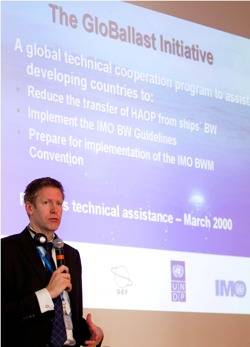SafeMed ll BWT Training Course Held in Malta
SafeMed ll Project course tackles environmental risks of ballast water at recent Malta training course
Methods of reducing environmental risks of invasive alien species transferred through ships’ ballast water in the Mediterranean Sea were discussed during a SafeMed II Project training course held in Malta.
Training and instruction emphasised the effective implementation of the International Convention for the Control and Management of Ships’ Ballast Water and Sediments (BWM Convention).
Although ballast water enhances the safety and efficiency of shipping operations, when not properly managed, this widespread maritime practice leads to risks of displacing marine species all over the world. This practice poses serious ecological, economic and health problems.
The BWM Convention, ratified by 28 countries and widely expected to enter into force during the next two years, offers a set of international measures for minimizing the translocation of marine species through ballast water.
“Preventing the transfer of marine species is a global responsibility, requiring a coordinated effort from Governments’ Administrations the world over,” said SafeMed Project Co-ordinator Jonathan Pace. “This training course sought to deliver Project Beneficiaries with a common set of knowledge and skills for a more uniform implementation of the BWM Convention across the Mediterranean region.”
Training was aimed at officials from maritime administrations responsible for the implementation of the BWM Convention within their respective Administrations. In line with this, the best practices for monitoring and enforcement of the BWM Convention requirements were identified and discussed in an open and engaging debate.
Officials from 12 SafeMed Beneficiaries namely, Albania, Bosnia & Herzegovina, Croatia, Egypt, Jordan, Lebanon, Libya, Montenegro, Morocco, the Palestinian Authority, Tunisia, and Turkey attended the course.
The SafeMed II Project is a €5.5 million EU-financed regional effort to enhance Euro-Mediterranean co-operation in the field of maritime safety and security, prevention of pollution from ships and marine environmental issues. Its objective is to provide Project Beneficiaries with the technical advice and support required to ensure more uniform and effective implementation of international maritime conventions and rules, thereby reducing accidents and pollution at sea throughout the Mediterranean Region.











